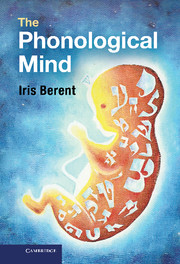Book contents
2 - Instinctive phonology
Published online by Cambridge University Press: 05 February 2013
Summary
Humans have some special phonological talents. We instinctively intuit that certain phonological patterns are preferred to others even if we have never heard them before, and we will weave phonological patterns regardless of whether our language uses oral speech or manual gestures. Phonological instincts are so robust that people spontaneously generate a whole phonological system anew, and when human cultures invent systems of reading and writing, they impose those patterns on their design. Phonological patterns, however, are not arbitrary: they conform to some recurrent principles of design. These principles are broadly shared across many languages, but they are quite distinct from those found in animal communication or music. This chapter documents those instinctive talents of our species, and in so doing, it lays down the foundation for discussing the architecture of the phonological system in subsequent chapters.
People possess knowledge of sound patterns
All human communities have natural languages that impose detailed, systematic restrictions on phonological patterns. Unlike traffic laws or the US Constitution, the restrictions on language structure, in general, and phonological patterning, specifically, are not known explicitly. Most people are not aware of those restrictions, and even when professional linguists desperately try to unveil them, these regularities are not readily patent to them. Yet, all healthy human beings know these restrictions tacitly – we encode them in our brain and mind and we religiously follow them in our everyday speech despite our inability to state them consciously. And indeed, we all have strong intuitions that certain sound structures are systematically preferable to others (see 1–3). For example, English speakers generally agree that blog is better-sounding than lbog; they prefer apt to tpa; they consider came as rhyming with same or even rain (indicated by ~), but not ripe; and they have precise intuitions on the parsing of words into smaller constituents. A frustrated motorist might refer to their noisy car exhaust as an eg-freaking-zaust, but not an e-freaking-gzhaust (a fact marked by the * sign, which conventionally indicates ill-formed linguistic structures).
Syllable-structure intuitions
Rhyme
Parsing exhaust
Information
- Type
- Chapter
- Information
- The Phonological Mind , pp. 9 - 34Publisher: Cambridge University PressPrint publication year: 2013
